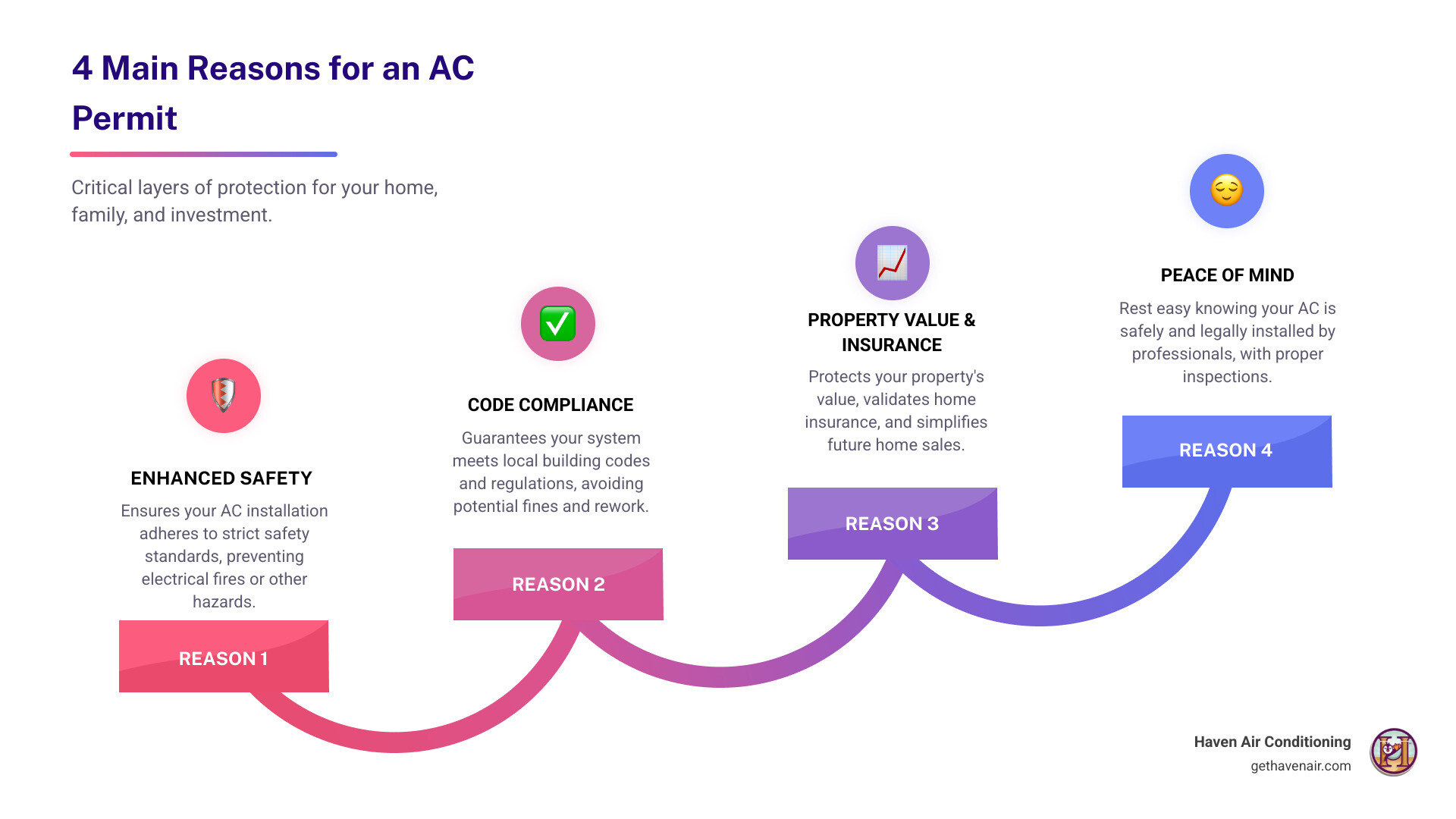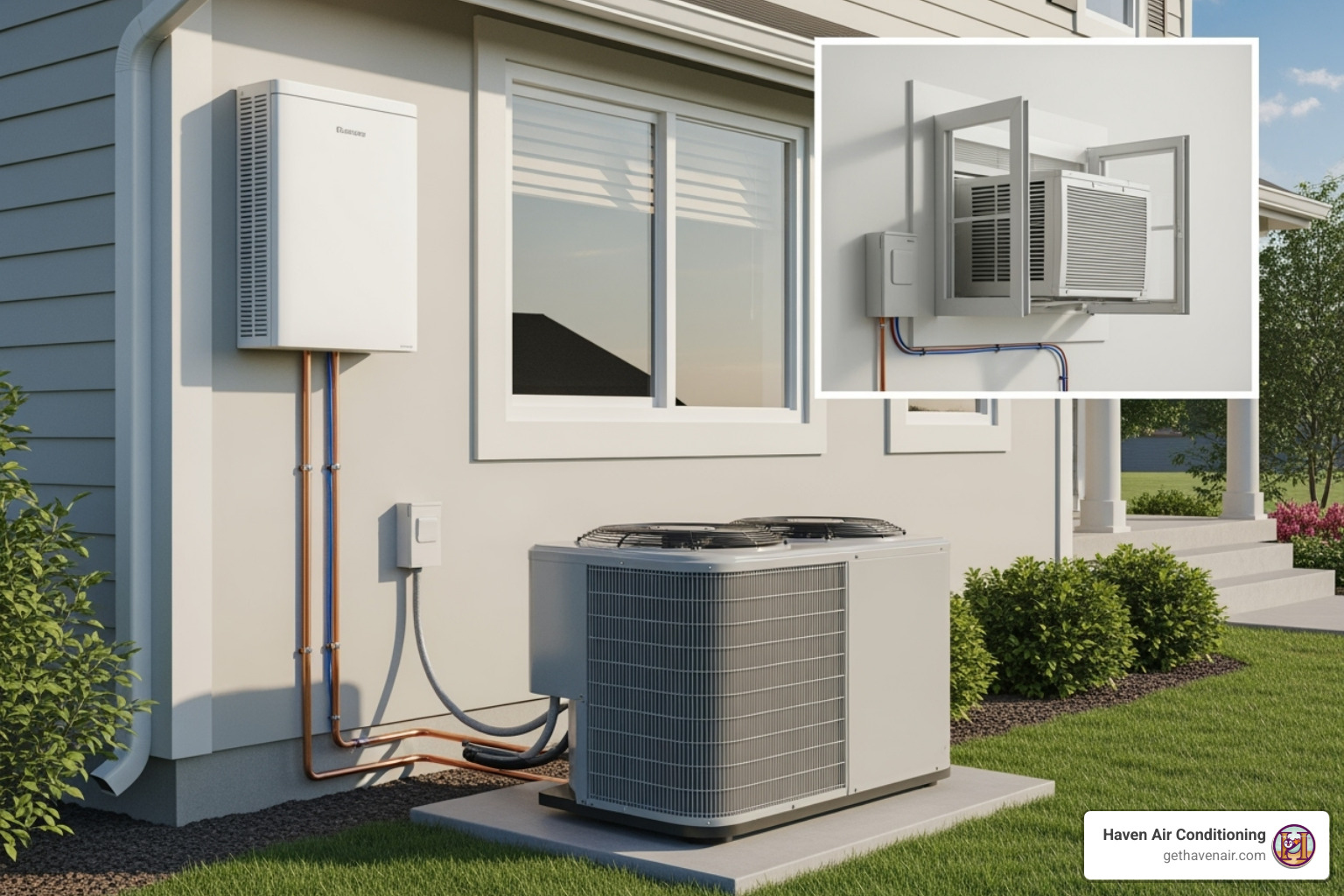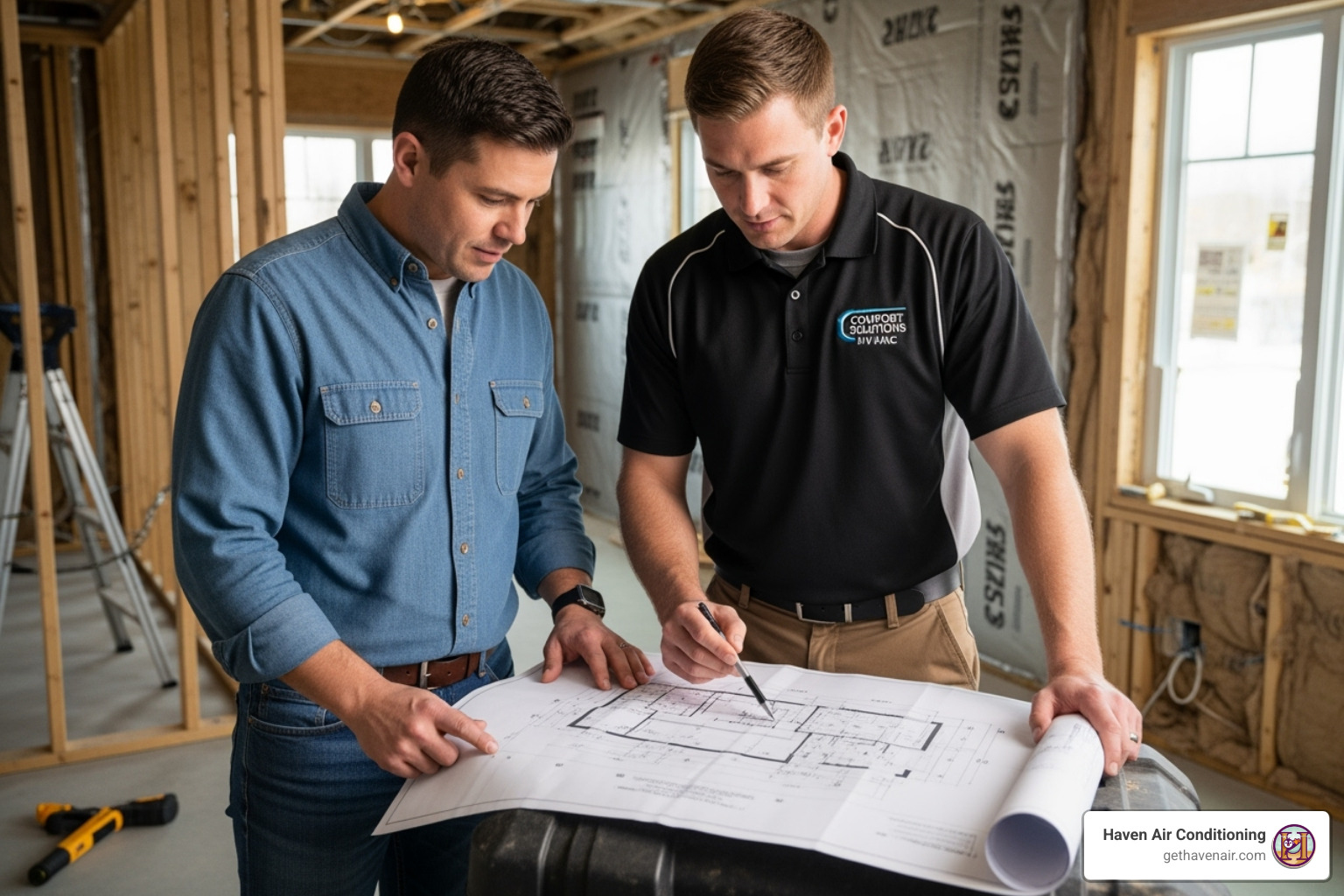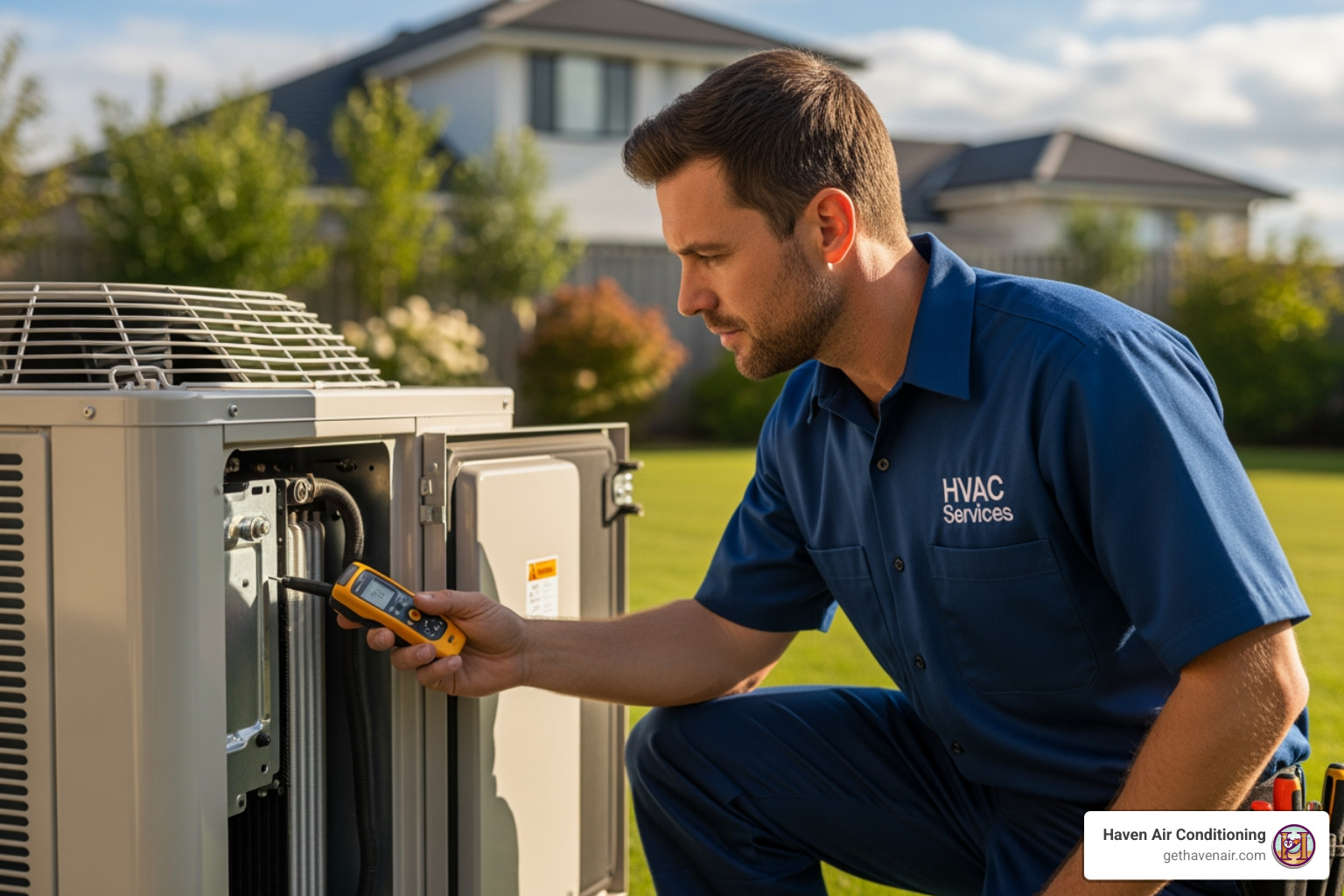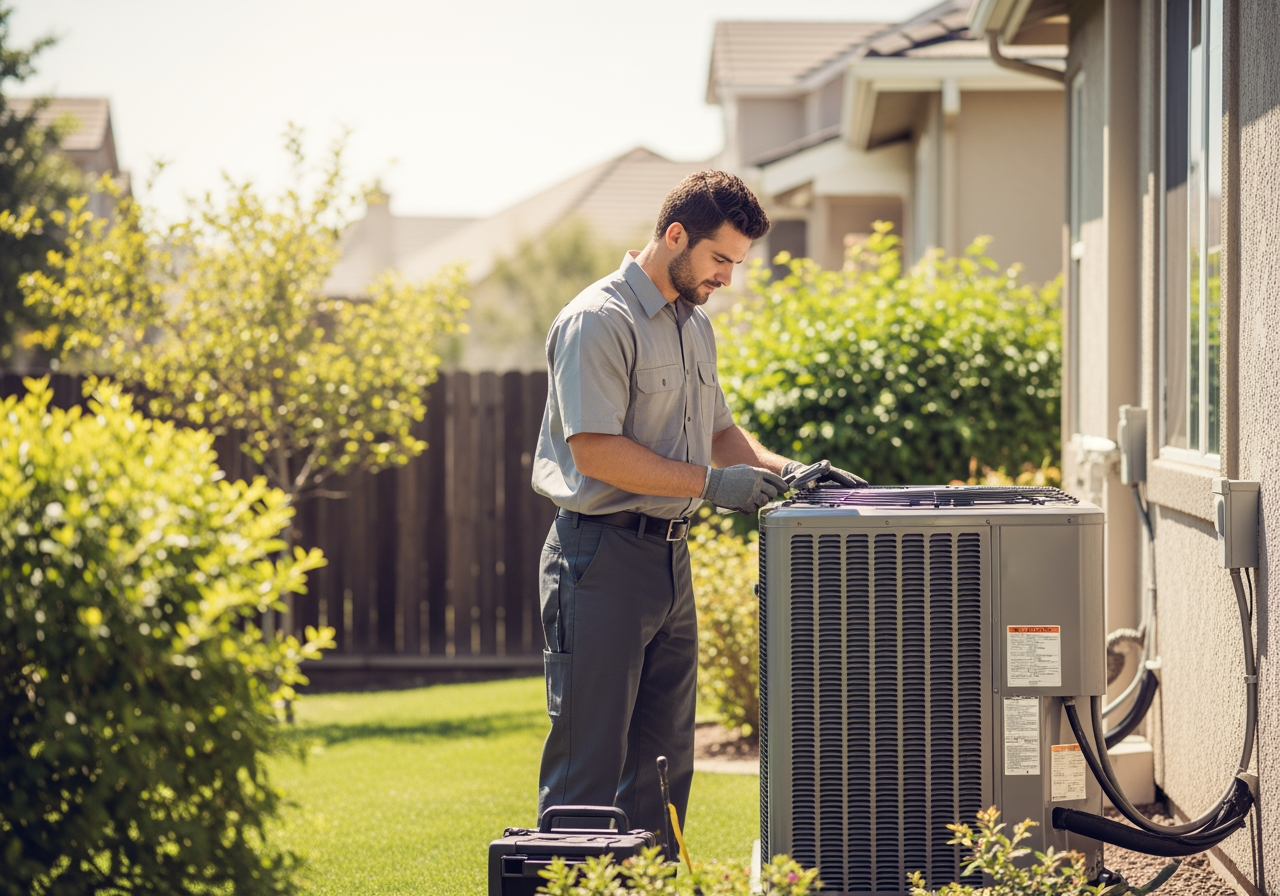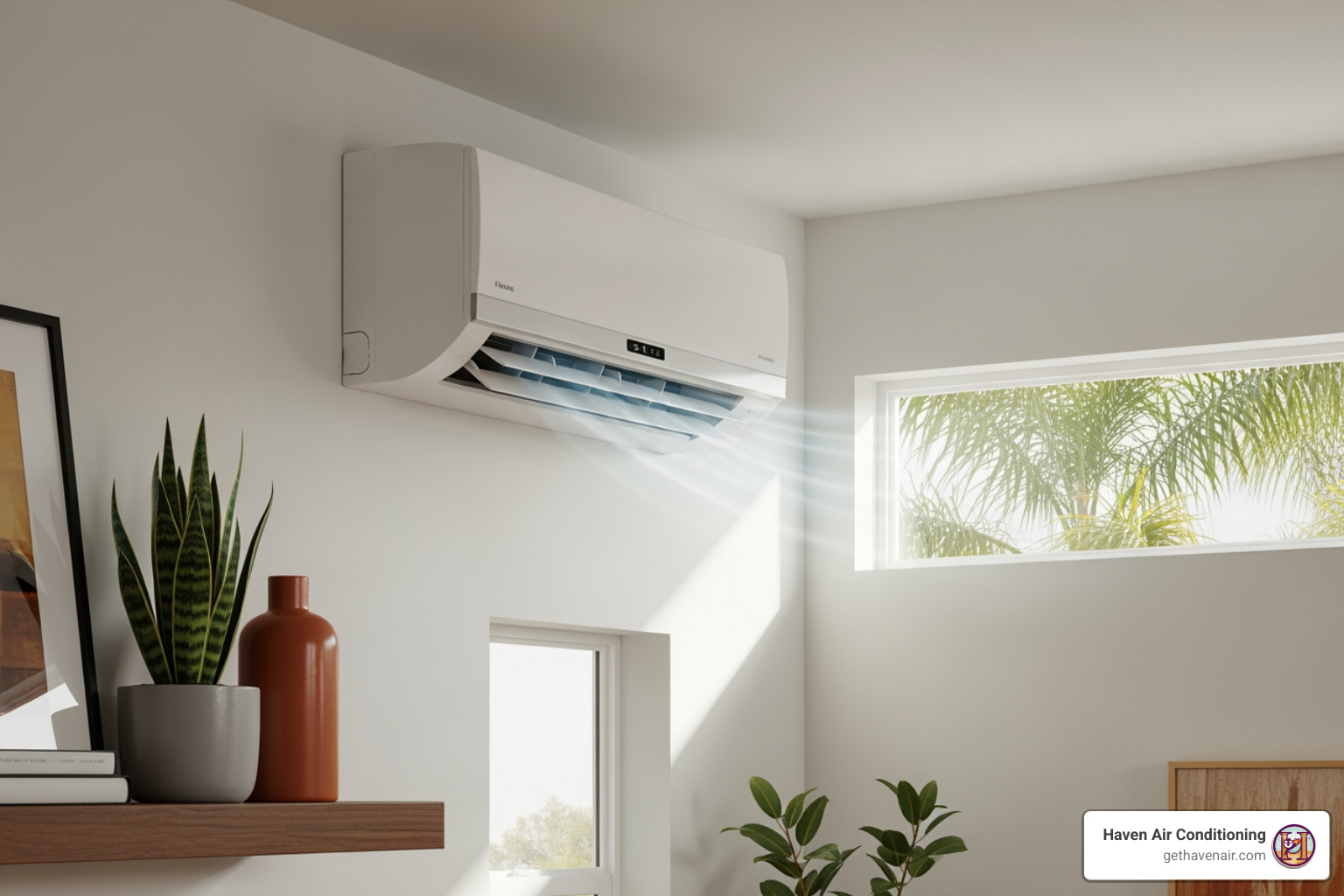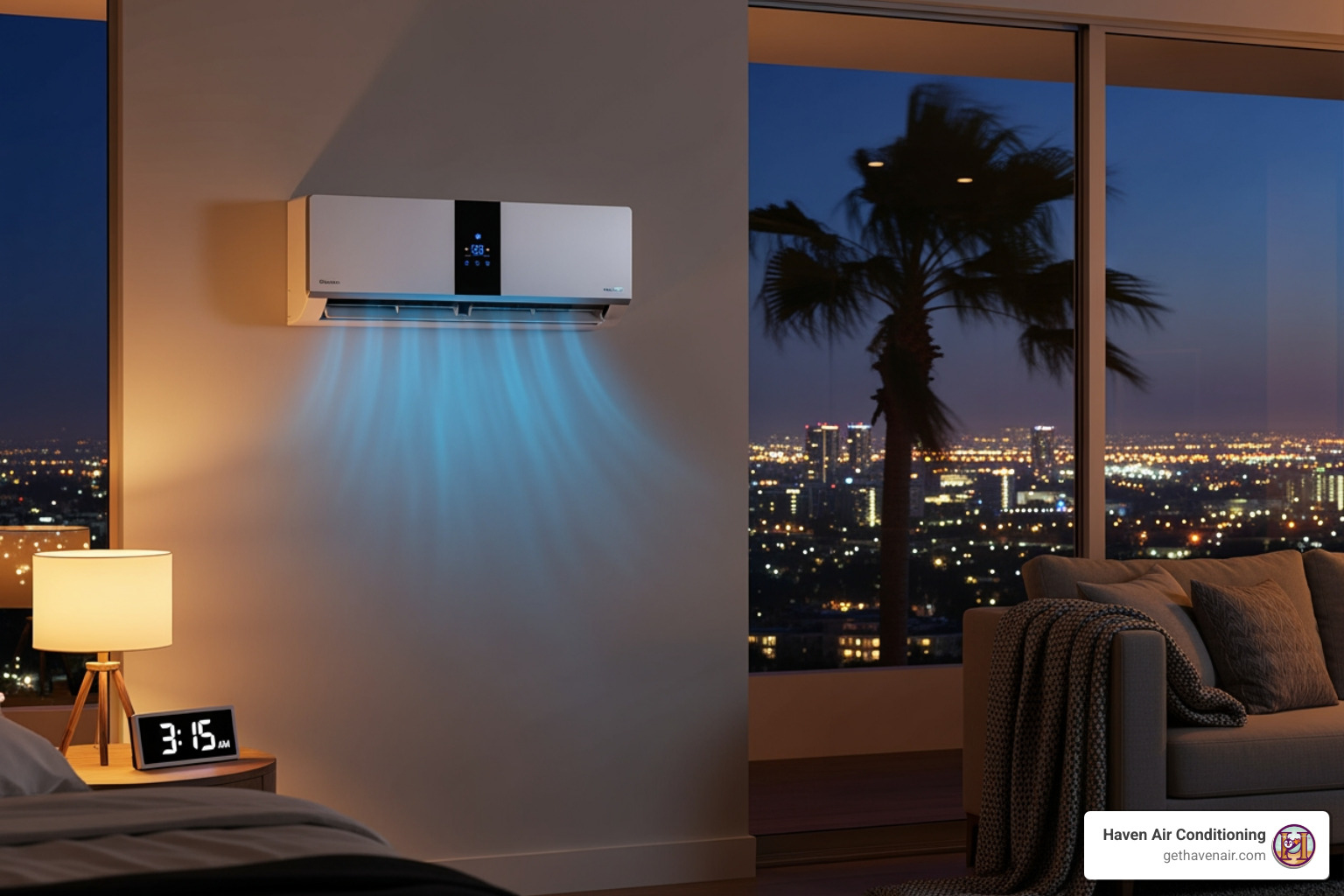Why AC Permits Matter More Than You Think
An ac permit is an official authorization from your local building department that allows you to legally install, replace, or significantly modify your air conditioning system. Many homeowners in Orange County don’t realize that skipping this step can lead to serious consequences, including voided warranties, denied insurance claims, safety hazards, and difficulties selling their home. The good news is that understanding when you need a permit and how to get one is straightforward.
Quick Answer: Do You Need an AC Permit?
You typically need an ac permit when:
- Installing a new central air conditioning system
- Replacing an existing HVAC system with a different type or capacity
- Adding or modifying ductwork
- Re-wiring electrical connections for a new AC unit
You generally don’t need a permit for:
- Portable or window AC units (without structural changes)
- Routine maintenance and filter changes
- Refrigerant recharge
- Minor repairs to existing equipment
For comprehensive guidance on your cooling options, check out our HVAC services overview, and when you’re ready to move forward, connect with our team through our AC installation page.
Permit requirements vary across Orange County. While some cities require permits for most permanent AC installations, others have more relaxed rules. Your contractor is your best guide, but understanding the basics puts you in control of your project.
Why AC Permits Are a Non-Negotiable for Home Safety
When you’re dreaming of a cool living room on a hot Orange County day, paperwork is the last thing on your mind. But an ac permit isn’t just red tape; it’s your first line of defense against serious problems.
Permits are your home’s safety net. A new AC system is a complex machine integrated into your home’s electrical and structural systems. These changes must meet strict safety standards and local building codes—rules created to prevent issues learned the hard way.
Building codes aren’t suggestions; they’re requirements designed to prevent electrical fires, equipment malfunctions, and structural damage. The permit process includes an independent inspection to verify the work was done right, like a final safety check before you use your new system.
Beyond safety, permits protect your property value and insurance coverage. Unpermitted work can scare off homebuyers or lead to denied insurance claims if an issue arises. Suddenly, that ac permit seems much more valuable.
The Different Types of Permits Involved
Depending on your installation, you might need several different permits. A professional contractor will manage these for you.
Electrical permits are essential for any central AC installation. Your new system is a major appliance that must be wired correctly to your electrical panel. This prevents overloaded circuits and fire hazards, ensuring the work meets all electrical codes.
Mechanical or HVAC permits cover the equipment itself, including the outdoor and indoor units, refrigerant lines, and ductwork. They ensure the unit is sized correctly for your home and that installation and refrigerant handling meet safety and environmental standards.
Building permits are needed for structural changes, like cutting into walls for new ductwork or installing a rooftop unit. This ensures your home’s structural integrity remains intact.
The Risks of Skipping the Permit Process
Skipping permits can turn a home improvement project into a nightmare. The consequences are real and can be costly.
Fire hazards and electrical shocks: Without inspections, faulty wiring can remain hidden, creating serious risks. Electricity demands proper, professional handling.
Premature equipment failure: Improper installation, like incorrect sizing, leads to inefficiency, higher energy bills, frequent repairs, and a shorter lifespan for your system.
Voided home insurance: Many insurance companies will deny claims related to damage caused by unpermitted work, leaving you to cover all costs.
Fines and penalties: Municipalities can issue hefty fines for unpermitted work and may require you to tear it out and start over, forcing you to pay for the job twice.
Difficulty selling your home: Unpermitted work is a major red flag for buyers and inspectors. It can lead to lower offers, failed deals, or the costly process of getting retroactive permits.
Getting an ac permit may seem like a small step, but it buys you priceless peace of mind, knowing your installation is safe, legal, and won’t cause future problems.
When is an AC Permit Required?
Wondering if you need a permit to install an AC unit? The answer depends on the project’s scope. Generally, the bigger the change to your home’s systems, the more likely you’ll need an ac permit. While local regulations vary, some general rules apply across most of Orange County.
The rule of thumb: if your project involves new installations, significant system replacements, or major modifications to your home’s electrical, structural, or core HVAC components, you’ll need a permit. These jobs require professional oversight to ensure safety and code compliance.
Installations That Typically Need a Permit
Here are the most common scenarios where an ac permit is almost certainly required.
Installing a new central AC system is the top reason for a permit. Likewise, replacing an old unit with a different type or capacity (e.g., upgrading from a 2-ton to a 4-ton system) requires one. These changes affect your electrical load and system design, and permits ensure everything is sized and installed correctly.
Adding new ductwork or making substantial changes to existing ducts also requires a permit to ensure proper airflow. Any major electrical re-wiring for a new unit, like upgrading a panel or adding circuits, requires an electrical permit to prevent fire hazards.
Any major modifications to your existing system fall into this category too. Relocating your outdoor condenser, replacing an integrated furnace, or making other significant changes beyond routine upkeep all typically require permits.
For a comprehensive look at what these projects involve, check out our AC Installation services page. The permit process exists to protect you, ensuring your new system operates safely and efficiently for years to come.
When is an ac permit not required?
The good news is that not every AC-related task requires a permit. Several common scenarios fall into the “no permit needed” category.
Portable and window AC units typically don’t need permits. As long as they don’t require permanent installation, structural changes, or new electrical circuits, you’re in the clear.
Minor repairs and maintenance don’t require permits either. This includes replacing small parts, fixing minor leaks, performing a refrigerant recharge, and routine filter changes.
Essentially, if you’re not permanently altering your home’s electrical or structural systems, you probably don’t need a permit. For more insight, see our guide on What to Expect During HVAC Installation. When in doubt, though, it’s always best to ask your contractor or local building department.
Navigating the AC Permit Application Process
So, you’ve determined your AC project requires an ac permit. What now? While the paperwork might seem intimidating, you probably won’t handle most of it yourself. Let’s walk through who does what, what information is needed, and how the process unfolds from application to final inspection.
Who Pulls the Permit: You or Your Contractor?
Many homeowners are relieved to learn that while they are responsible for ensuring a permit is obtained, a reputable licensed HVAC contractor will handle the entire permit process for you. It’s a key part of their service and is in everyone’s best interest.
Your contractor deals with permits daily. They know the local building departments, the required forms, and the specific rules for cities like Anaheim, Irvine, and Fullerton, ensuring a smooth and quick approval process.
When you work with licensed HVAC contractors like our team at Haven Air Conditioning, we take care of pulling the ac permit, submitting all required documentation, and scheduling inspections. You get to relax while we handle the paperwork. For more guidance on selecting a contractor who’ll manage this process smoothly, check out our article on Choosing Professional HVAC Installation.
Always confirm this during your initial consultation. Ask directly: “Will you be pulling all the necessary permits for this installation?” A professional contractor should give you a confident yes.
What information is needed for an ac permit?
Your contractor compiles the ac permit application, but it’s helpful to know what’s included. The building department needs details to verify the installation will be safe, code-compliant, and appropriate for your home.
The application package generally includes:
- Basic property details (address, owner name)
- Equipment specifications (model number, capacity, efficiency ratings)
- A site plan showing the outdoor unit’s location and setbacks
- A description of the electrical work and circuit specifications
- The contractor’s license information
Once the application is submitted and the permit fee is paid, the building department reviews the plans. After installation, they’ll schedule required inspections to verify everything was done according to the approved plans and local codes. Your contractor coordinates all of this, keeping you informed at each step.
Local Regulations and Special Considerations in Orange County
AC permit requirements vary dramatically across Orange County cities. Rules in Anaheim differ from Irvine, and Fullerton’s standards may not apply in Costa Mesa. Each municipality has its own bylaws governing unit placement, noise levels, and more.
These regulations balance your comfort with community standards, property values, and neighborly harmony. Some cities focus on aesthetics, requiring units to be screened, while others prioritize setback distances or have strict noise ordinances.
The good news? You don’t need to become an expert in every municipality’s codes. That’s where working with a local HVAC company like Haven Air Conditioning makes all the difference. We’ve been installing systems across the Greater Orange County Area for years, from Anaheim to Aliso Viejo, and we know these local requirements. For broader context on California’s planning requirements, check out Do you need planning permission to install AC in California?. And for a complete picture of our regional services, visit our HVAC Orange County CA page.
Understanding Your City’s Specific Rules
Your contractor should handle the specifics, but it helps to know where to find your city’s rules.
Anaheim has detailed placement and screening requirements, which you can find on the City of Anaheim’s official website. Regulations often address noise and visual impact.
Fullerton has its own setback and rooftop installation guidelines. Irvine, with its master-planned communities, often has extra reviews, including HOA and architectural standards that go beyond basic city permits.
The reality is that each of the cities we serve—including Buena Park, La Palma, Rossmoor, Cypress, Norwalk, Stanton, Rowland Heights, Whittier, La Habra, Santa Ana, Midway City, Westminster, Garden Grove, Costa Mesa, Fountain Valley, Los Alamitos, Riverside, Chino, Eastvale, Coronita, Home Gardens, Ontario, Norco, Corona, Aliso Viejo, Laguna Niguel, Laguna Beach, Laguna Woods, and Laguna Hills—has its own personality when it comes to regulations.
Your best move is to partner with a licensed HVAC contractor who knows your area. They’ll steer local building department requirements and ensure your installation meets every rule.
Special Zones and Noise Ordinances
Beyond standard city rules, some properties face extra oversight on ac permit applications. These considerations protect community character and quality of life.
Homes in historic districts face stricter rules on visual impact. Your outdoor unit may need to be screened or placed in a less visible location to preserve the neighborhood’s aesthetic.
Property line setbacks are common, though distances vary by city. Most municipalities require your outdoor unit to sit a certain distance from property boundaries. These rules ensure maintenance access, prevent neighbor disputes, and maintain proper airflow.
Most important for neighborly harmony are noise regulations. Cities set decibel limits, especially at night. If your unit is too loud, you may need acoustic barriers or a quieter model. Modern AC units are often quiet enough to meet these standards easily.
These regulations protect your investment by preventing complaints from neighbors or orders to relocate your equipment. Discuss these considerations with your contractor, and they’ll design a compliant installation.
Frequently Asked Questions about AC Permits
We’ve covered a lot of ground regarding ac permit requirements, but a few questions consistently pop up. Let’s tackle them head-on.
Are there fees associated with obtaining an AC installation permit?
Yes, ac permits have fees. These reasonable costs cover the administrative and inspection work your municipality performs to ensure a safe, correct installation. The fee amount varies by location in Orange County and the project’s scope. A new system installation will cost more in fees than a simple replacement, and multiple permits (e.g., electrical and mechanical) may have separate fees.
A licensed contractor can estimate these fees for you. While an added expense, permit fees are a small investment in protecting your home and peace of mind compared to the risks of unpermitted work.
Where can I find information about AC permit requirements in my specific location?
Your city or county’s official website is the best source for ac permit requirements. Look for the “Building and Safety” or “Permit Services” section. Most Orange County cities, including Anaheim, Fullerton, and Irvine, offer detailed online resources and forms.
If you still have questions, call your local building department directly. The staff can provide precise information for your property.
However, the easiest route is to consult a qualified local HVAC professional. A reputable contractor like us at Haven Air Conditioning is familiar with local ac permit requirements and can manage the entire process for you, saving you time and ensuring compliance.
Local requirements do change, so always verify you’re working with the most current information before starting a project. That’s where having a knowledgeable local partner really pays off.
Stay Cool and Compliant
Understanding ac permit requirements can be a lot to take in, from knowing when a permit is needed to navigating local rules. What’s most important to remember is that the permit process exists to protect you, your family, and your home.
Proper permits ensure your system is installed safely, meets electrical codes, and protects your home’s value. It validates your insurance, helps you avoid fines, and prevents issues when selling your home. It provides peace of mind that the job was done right.
The permit landscape across Orange County can be a maze, but that’s why working with local professionals is key. At Haven Air Conditioning, we steer these requirements for communities from Anaheim to Aliso Viejo. We handle the permits and paperwork, ensuring your installation meets all standards so you can simply enjoy your comfortable home.
Whether you’re installing your first central AC system or upgrading to a more efficient unit, we’re here to guide you through every step. Our team of certified, friendly professionals brings not just technical expertise but also exceptional customer service and attention to detail to every project.
Ready to move forward with your cooling project the right way? For expert help with your cooling needs in Anaheim and beyond, explore our AC installation services or connect with us through our Expert HVAC Services page. Let’s work together to keep you cool, comfortable, and completely compliant – because that’s what we do best.


